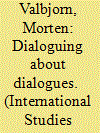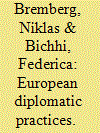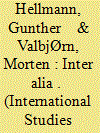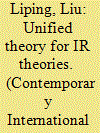|
|
|
Sort Order |
|
|
|
Items / Page
|
|
|
|
|
|
|
| Srl | Item |
| 1 |
ID:
155324


|
|
|
| 2 |
ID:
148312


|
|
|
|
|
| Summary/Abstract |
As the aim of this special issue is to show practice approaches at work in the case of European diplomacy, this introduction provides readers with a hands-on sense of where the conversation about practices and European diplomacy currently stands. By introducing the key terms and overviewing the literature, the article contextualises the guiding questions of the special issue. It starts by reviewing how practice approaches have evolved in IR debates. It then describes European diplomacy’s nuts and bolts in a post-Lisbon setting. It continues by focusing on specific practices and analytical mechanisms that contribute to understand European diplomacy’s transformations and the role of security. While the debate about practices goes beyond the case of diplomacy, the latter has become a showcase for the former and this special issue continues the debate on practices and diplomacy by zooming in on the European Union.
|
|
|
|
|
|
|
|
|
|
|
|
|
|
|
|
| 3 |
ID:
155322


|
|
|
|
|
| Summary/Abstract |
The field of IR has been described as an “‘inter’-type discipline,” in the sense that it is devoted to studying the interactions of different kinds of international actors (Lapid 1996, 10). However, despite the fact that the discipline has never been blind vis-à-vis the “in-between” (or relational) dimension of the subject matter (Kaiser 1971, 791; Rosenau 1990, 40–42; Kratochwil 2007, 502–3), much of the focus in recent years’ discussions has, in various ways, been directed to the inter-national in IR-theory. While acknowledging that this has alerted the discipline about the prevalent Western-centrism in much IR-theory and how it helped foster an awareness of the diversity of IR-communities around the globe, the present forum takes its point of departure in the view that in order to make the academic field of IR-theory worthy of its own name, it is now time to move the debate about global IR (Acharya 2014) a step further and connect it to what has been unearthed in recent decades’ mapping of IR around the globe. To succeed in this endeavor, this forum suggests that it is necessary to both refocus and recalibrate the “inter” in IR-theory. Thus, in addition to bringing attention back to the inter-national dimension of IR-theory, it is also necessary to examine the conditions that determine how relevant actors (e.g., scholars and practitioners) interact in producing knowledge about “the international,” that is, the forms, formats, and foci of intellectual interactions (cf. Rösch and Watanabe 2016; Acharya 2016).
|
|
|
|
|
|
|
|
|
|
|
|
|
|
|
|
| 4 |
ID:
155323


|
|
|
| 5 |
ID:
155325


|
|
|
| 6 |
ID:
151815


|
|
|
|
|
| Summary/Abstract |
This article investigates the relationship between trade and politics, particularly the effect of improved or deteriorated political ties upon economic relations with particular reference to the bilateral trade and diplomatic relations between Turkey and Israel. The study attempts to identify under what conditions bilateral trade is affected by any significant change in political relations. It finds that economic relations were relatively bolstered at times of enhanced political relations whereas visible deterioration or decline was observed in the volume and state of trade relations at some critical points when diplomatic relations worsened. However, this does not refer to a constant and steady decline and is limited to some severe diplomatic crises experienced in bilateral relations. Some major premises of Realist and Liberal theories are employed to analyse the findings in this study. These findings are at least partially against the main arguments in the literature of the Liberal approach that trade determines politics. However, the course of trade relations between Israel and Turkey appears to be consistent with the tenets of the Realist theory which pays greater attention to security than it does to trade relations and argues that trade may not be relevant to improved bilateral political relations.
|
|
|
|
|
|
|
|
|
|
|
|
|
|
|
|
| 7 |
ID:
155321


|
|
|
|
|
| Summary/Abstract |
The field of IR has been described as an “‘inter’-type discipline,” in the sense that it is devoted to studying the interactions of different kinds of international actors (Lapid 1996, 10). However, despite the fact that the discipline has never been blind vis-à-vis the “in-between” (or relational) dimension of the subject matter (Kaiser 1971, 791; Rosenau 1990, 40–42; Kratochwil 2007, 502–3), much of the focus in recent years’ discussions has, in various ways, been directed to the inter-national in IR-theory. While acknowledging that this has alerted the discipline about the prevalent Western-centrism in much IR-theory and how it helped foster an awareness of the diversity of IR-communities around the globe, the present forum takes its point of departure in the view that in order to make the academic field of IR-theory worthy of its own name, it is now time to move the debate about global IR (Acharya 2014) a step further and connect it to what has been unearthed in recent decades’ mapping of IR around the globe. To succeed in this endeavor, this forum suggests that it is necessary to both refocus and recalibrate the “inter” in IR-theory. Thus, in addition to bringing attention back to the inter-national dimension of IR-theory, it is also necessary to examine the conditions that determine how relevant actors (e.g., scholars and practitioners) interact in producing knowledge about “the international,” that is, the forms, formats, and foci of intellectual interactions (cf. Rösch and Watanabe 2016; Acharya 2016).
|
|
|
|
|
|
|
|
|
|
|
|
|
|
|
|
| 8 |
ID:
117466


|
|
|
|
|
| Publication |
2012.
|
| Summary/Abstract |
Examines the responses of the Russian Federation (RF) and People's Republic of China (PRC) to the September 11 attacks on the United States. He argues that the sudden shift in RF and PRC policies toward the United States following the attacks poses a puzzle for existing IR theories. In order to comprehend RF and PRC behavior, he claims that we need to recognize the role of implicit norms of sympathy.
|
|
|
|
|
|
|
|
|
|
|
|
|
|
|
|
| 9 |
ID:
193226


|
|
|
|
|
| Summary/Abstract |
Theories can either have something to say about the future or provide foundations for making judgments about the future. In either case, however, a theory remains inadequate for obtaining insights about the future which no amount of advancements in information access and quality or methodologies can overcome. This article suggests that inadequacy persists and cannot be completely overcome because of the long-term and short-term time perspectives embedded within a theory. Using illustrative examples of time perspectives from Morgenthau’s theory of international politics, this article illustrates and analyses how long-term and short-term time perspectives within a theory delimit claims or judgments about the future made within or derived from a theory. Subsequently, readers gain insights on how to conceptualise long-term and short-term time perspectives, methods for identifying and differentiating between time perspectives within a theory and the distinct work time perspectives perform within a theory when multiple time perspectives are present.
|
|
|
|
|
|
|
|
|
|
|
|
|
|
|
|
| 10 |
ID:
091910


|
|
|
|
|
| Publication |
2009.
|
| Summary/Abstract |
This article puts forward a unified theory for international relations (IR). It first divides current western IR theories into hard and soft categories. then points out conceptual fallacies of the three major debates in the history of western IR theories by using this categorization as an analytical guide. It further asserts that such a categorization should help clarify the present theoretical chaos by pursuing a unified IR theoretical system.
|
|
|
|
|
|
|
|
|
|
|
|
|
|
|
|
|
|
|
|
|